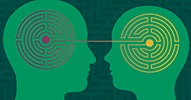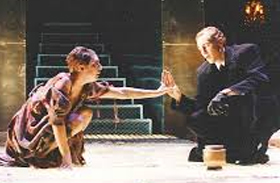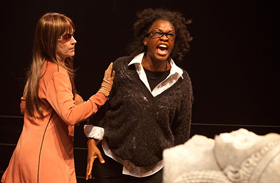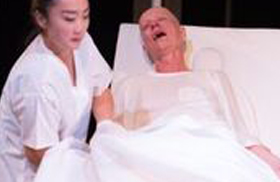Empathy and Affect in Medical and Theatrical Practice: Sophocles, Beckett, Edson
Conference Details
Friday 13th - Saturday 14th October 2017
Rehearsal Room, Millburn House, University of Warwick
The event is free but places will be limited. Please register by contacting Ania Crowther before Monday 9th October 2107. Further practical details will be sent out to all registered shortly. The location, Milburn House, is no. 38 on the map.
 This two-day event brings together theatre practitioners, clinicians, and scholars in humanities and medical ethics with other members of the public to consider the embodiment of illness (both physical and mental) in theatre. It will take as its starting point the following questions:
This two-day event brings together theatre practitioners, clinicians, and scholars in humanities and medical ethics with other members of the public to consider the embodiment of illness (both physical and mental) in theatre. It will take as its starting point the following questions:
- How does theatre elicit empathetic engagement; what different perspectives can it provide on a character or a ‘condition’; and how might this bear on encounters in medical practice?
- How does the entire theatrical language of a play – the bodies, stage, use of space and gesture, lighting, sound, and so on – contribute to the exploration of the pathologies represented and the relationships that surround them?
- What does theatre, including masked theatre, tell us about strategies for communication, particularly when the capacity for self-expression is impaired?
- What might the processes of embodiment entailed in theatrical performance offer to our understanding of somatization, physical manifestations of mental distress, and the relationship between mental and physical illness?
- How might the ethics of the consulting room be illuminated by the encounters in and complex emotional texture of these works?
The Three Plays
- Why might it be difficult to hear what Electra is saying in Sophocles’s tragedy of that name?
- How does Beckett’s play Not I work on the nerves and not on the intellect?
- How does the disjuncture between Vivian’s sharp mind and her failing body bear on her story in Margaret Edson’s Wit?
Three plays from very different contexts—Sophocles’ Electra,


Samuel Beckett’s Not I, and Margaret Edson’s Wit


will provide the source material to stimulate interdisciplinary discussion of these questions. These plays, and our discussions, consider complex and unexplained illness, trauma and distress, conditions that themselves affect and impair communication, life-threatening conditions and end of life care, pain and grief. We will ask what role the pre-linguistic, the bodily, and the affective have in the experiences and relationships that attend such conditions. What ethical and emotional challenges do doctors, nurses, patients, carers and families face in the particular social exchanges that medicine entails?
Those who attend will be encouraged to be active participants in discussions, stimulated by short position papers, round table discussions, and performances of excerpts from all three plays.
Participants include:
- Emma Barnard, Mixed-Media Artist, creator of Patient as Paper project with surgeon Mike Papesch
- Elizabeth Barry, Reader in English, University of Warwick (co-organizer)
- Matthew Broome, Professor of Psychiatry, University of Birmingham
- Jonathan Cole, Professor of Neurology, Bournemouth University & Poole Hospital
- Ania Crowther, Research Associate in English, University of Warwick (co-organizer)
- Anna Harpin, Associate Professor in Theatre and Performance Studies, University of Warwick (co-organizer)
- Jonathan Heron, Artistic Director, Fail Better Productions; Theatre scholar; Principal Teaching Fellow, University of Warwick
- John Michael, Assistant Professor of Philosophy, University of Warwick
- Jane Montgomery Griffiths, Director, Actor, Associate Professor in Theatre, Monash University, Australia (co-organizer)
- Femi Oyebode, Professor of Psychiatry, University of Birmingham
- Jan Parker, Senior Member of Faculties of Classics and English, University of Cambridge; Director of Studies for English, Emmanuel College, Cambridge (co-organizer)
- Zoë Playdon, Emeritus Professor of Medical Humanities, Birkbeck College, University of London
- Swaran Singh, Professor and Head of Mental Health and Wellbeing, University of Warwick
- Anne Whitehead, Senior Lecturer in English, University of Newcastle
Programme:
Friday 13th October
10.00am-10.30am Coffee and Registration
10.30am-11am Session 1: Keywords: Medicine, Theatre, Practice
An introduction to the discussions taking place of the two days, and the key ideas we want to discuss, challenge and test. Contributions from Dr Elizabeth Barry (English, Warwick), Dr Jan Parker (Classics, University of Cambridge), Dr Jane Montgomery Griffiths (Theatre, Monash University, Melbourne), Dr Anne Whitehead (English, University of Newcastle), author of Medicine and Empathy, and others.
11.00am-12.30pm Session 2: ‘Presenting as’: What is wrong with Electra?
In Sophocles’ play, Electra comes out, comes under scrutiny, presenting her symptoms, her pain, her shame. Actors playing her, psychiatrists advising, and directors workshopping the play have to come to a diagnosis – what is wrong with Electra?
But what issues, what judgements and what silencings are in play in her ‘presentation’? What other narratives of her case could be explored?
Associate Professor of Theatre Jane Montgomery Griffiths, who has directed and played various roles in the play numerous times, will open up a discussion of the possible power dynamics and various lines of investigation which could come from Electra’s ‘presenting’. We will end the session with the question of what might ‘restore’, ‘heal’ or ‘be a good end’ for Electra.
12.30pm-1.30pm Lunch (lunch will be available to buy at nearby cafés on the university campus)
1.30pm-3pm Session 3: Interactions from Electra
Actors playing Electra have talked of their embodying of her trauma-inducing bonds—with her murdered father, her mother, her absent brother.
We will play & replay crucial scenes to ask both actors and ‘audience’ what is going on. How many lines of interpretation can we generate about ‘traumatic’ family relationships, and how might these inform the way we consider the role of family in medical and psychiatric diagnosis and care?
3pm-3.30pm Coffee
3.30pm-5pm Session 4: Cracked: Psychosis and the Family
There will be a screening of short excerpt from Cracked, a piece of verbatim theatre based on qualitative research in Health Studies at Warwick with young people who have experienced psychosis and their families, followed by responses from Professor Swaran Singh (Warwick Medical School), whose research was the basis for this work, Professor Matthew Broome (Director, Birmingham Institute of Mental Health), and Dr Anna Harpin (Theatre and Performance Studies, Warwick; author of the forthcoming Disordered: Madness and Cultural Representation (2018))
5-6pm Talk by artist Emma Barnard and drinks
Programme:
Saturday 14th October
10.00am—11.15am Session 5. About Face: Möbius syndrome, Masks, Empathy and Affect
Communication and empathy: a case study. Presentations and a round table discussion about Möbius syndrome, a facial paralysis condition, and the obstacles it presents to communication and empathy for those with the condition and those close to them. This sessions will look at the role played by theatrical practice and improvisation in John Michael’s recent work helping young people with Möbius syndrome compensate through voice and gesture. We will reflect on what experiences of the condition and the role of the body and performance in coping with it tell us about the face and empathy, about embodiment and emotion. We will also draw related insights from masked theatre on communicating through prosody and gesture. With Professor Jonathan Cole (Neurology), author of The Invisible Smile (with Henrietta Spalding) and About Face, Dr John Michael (Philosophy), and Dr Jan Parker (Classics)
11.15am—11.30am Coffee
11.30am-1.00pm Session 6. Beckett’s Not I and the Clinic: Helpless Compassion
The session will open with short presentations on Beckett’s play Not I and its applications in medical settings by Dr Elizabeth Barry (English, Warwick) and Dr Jonathan Heron (IATL, Warwick), and there will follow an experiential workshop on the play, and structured discussion.
1.00pm-2.00pm Lunch
2.00pm-4.00pm Session 7. Performing Pain in Margaret Edson's Wit
This session looks at the issues of empathy and ethics raised by Margaret Edson’s Pulitzer prize-winning play, Wit, and the application they might have to research synergies between medical and performance studies. The panel will start, by way of a provocation, with a short paper by Dr Jane Montgomery Griffiths (Monash University), using last year’s Melbourne production of Wit as a case study. It will address the semiotic significance of the body in performance as a tool for empathy and look at the differences between the frames of live and recorded performance, before opening up to a general discussion.
4pm-4.15 Coffee
